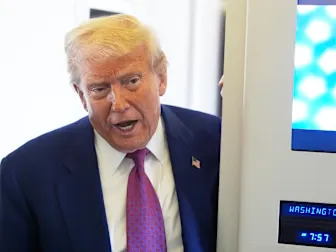The US and China agreed to a framework and implementation plan to ease tariff and trade tensions on Tuesday. President Trump signaled his approval, saying the deal was "done" pending sign-off from him and Chinese President Xi Jinping.
Trump and other US officials indicated the deal should resolve issues between the two countries on rare earths and magnets. Trump said Wednesday that the US will allow Chinese students in US colleges, a sticking point that had emerged in the weeks following the countries' mid-May deal in Geneva.
Trump, however, made no mention of loosening US export controls, particularly on the design and manufacture of semiconductors.
Trump said the US would impose a total of 55% tariffs on Chinese goods. Yahoo Finance's Ben Werschkul reports , citing a White House official, that Trump arrived at that figure by adding together an array of preexisting duties and not any new tariffs.
The president combined the existing 20% tariffs over illegal drugs and migration with 10% "Liberation Day" tariffs, with other sector-specific duties in place that average out to 25% — but only apply to certain goods.
Outside analysts, such as the budget lab at Yale, have calculated that the effective tariff rate on China overall is more like 33%. Trump said China's tariffs on US imports would be 10%.
Meanwhile, though Trump's most sweeping tariffs continue to face legal uncertainty, on Tuesday, the president received a favorable update. A federal appeals court held a decision saying his tariffs can temporarily stay in effect. The US Court of International Trade had blocked their implementation last month, deeming the method used to enact them "unlawful."
Trump celebrated the ruling as a "great and important win."
Read more: What Trump's tariffs mean for the economy and your wallet
The latest twists and turns in Trump's trade policy come as the president pushes countries to speed up negotiations. The US sent a letter to partners as a "friendly reminder" that Trump's self-imposed 90-day pause on sweeping "reciprocal" tariffs is set to expire in early July.
White House advisers have for weeks promised trade deals in the "not-too-distant future," with the only announced agreement so far coming with the United Kingdom. US and Indian officials held trade talks this week and agreed to extend those discussions on Monday and Tuesday ahead of the July 9 deadline.
Here are the latest updates as the policy reverberates around the world.
LIVE 1151 updates

